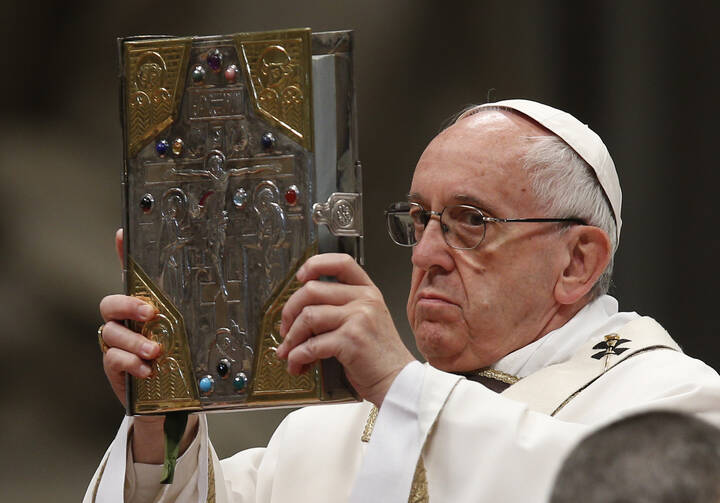VATICAN CITY (CNS) — In an increasingly complex world of unprecedented scientific and technological challenges, theologians must communicate what is essential about life and help Christians proclaim God’s merciful, saving grace, Pope Francis told a group of Italian theologians.
The theologians’ task requires being “faithful and anchored” to the teachings of the Second Vatican Council and continuing the council's focus on the church “letting itself be enriched by the perennial newness of Christ’s Gospel,” he said.
Speaking Dec. 29 at the Vatican to members of the Italian Theological Association, which was celebrating its 50th anniversary, the pope said theologians and other church workers must always refer back to Vatican II where the church recognized its responsibility to “proclaim the Gospel in a new way.”
At Vatican II, the pope said, the church recognized its responsibility to “proclaim the Gospel in a new way.”
Such a task is done not by changing the message, but by communicating the perennial message with “faithful creativity” to a world experiencing rapid transformations, he said.
These changes and challenges require that the church, and theologians in particular, believe that the Gospel “can continue to touch the women and men of today” and work to clearly show people what lies at the heart of the Gospel.
This theological effort of showing what is essential is “indispensable” in a highly complex world of unprecedented scientific and technological advancement, and in a culture where “distorted views of the very heart of the Gospel” can sneak in and spread, he said.
“There needs to be a theology that helps all Christians proclaim and show, most of all, the salvific face of God, the merciful God, especially given the presence of some unprecedented challenges that involve humanity today, such as: the environmental crisis; the development of neuroscience or technology that can alter human beings; ever greater social inequalities or the migration of whole peoples; and relativism in theory and practice.”
He said theology must develop from the work of women and men working together and supporting each other as a community, not as rivals; working to serve the universal church and all particular churches; and to “reimagine the church so that it may conform to the Gospel that it must proclaim.”











The ecological crisis, rooted in the patriarchal culture that corrupts the communion of man and woman, and therefore also the harmony between humanity and nature, may be an opportunity to guide theological reflection away from religious patriarchy. The following are some personal reflections: http://pelicanweb.org/CCC.TOB.html
I am glad that Pope Francis keeps attention on Vatican II. So many people seem to want to return to a time before Vatican II.